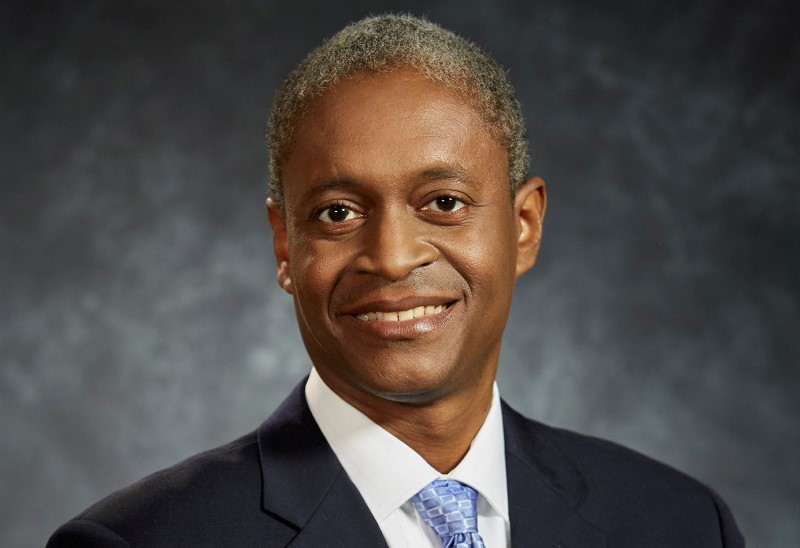 © Reuters. President of the Federal Reserve Bank of Atlanta, Bostic, seen in this handout photo
© Reuters. President of the Federal Reserve Bank of Atlanta, Bostic, seen in this handout photoBy Howard Schneider
ATLANTA (Reuters) – The Federal Reserve may only need to raise interest rates two or fewer times in 2018 given weak price pressures and possible loss of public confidence in its ability to hit a 2 percent inflation target, Atlanta Fed President Raphael Bostic said on Monday.
Bostic said he was still on board with the U.S. central bank’s “slow removal” of monetary policy accommodation in the face of domestic economic growth he feels may hit 2.5 percent this year as well as continued low unemployment.
“However, I would caution that that doesn’t necessarily mean as many as three of four moves per year,” Bostic said in prepared remarks for a speech to the Rotary Club of Atlanta, separating himself from Fed policymakers’ median expectation of three rate increases this year.
The central bank raised rates three times in 2017.
Weak wage growth and inflation are two reasons to be guarded with future rate increases, he said.
In addition, he said he is concerned the public may be losing confidence in the Fed’s commitment or ability to reach its inflation target, “anchoring” public expectations below that level. Public and market expectations are considered an important component in inflation outcomes, and Bostic said recent survey evidence “indicates that individuals may not be completely convinced.”
“This possibility is one factor that might argue for being somewhat more patient in raising rates,” he said.
Bostic added that the estimated “neutral” rate of interest that would keep inflation at target and economic growth at trend may have slipped to “close to” 2 percent. If true, it means the Fed could only raise rates two or three more times, from the current range of between 1.25 percent to 1.50 percent, before monetary policy is no longer “loose” and encouraging economic activity.
Even as it raises rates the Fed wants to remain “accommodative,” with a federal funds target below neutral.
With the Fed also tightening policy by shrinking its balance sheet each month, the central bank “is approaching a more neutral stance,” and needs to keep that in mind in setting rates, Bostic said.
Bostic said his outlook incorporates a “modest” increase in economic activity from the Trump administration’s tax cuts.
But he said that among businesses surveyed after the House of Representatives’ version of the tax overhaul had been approved, two-thirds or more of larger firms said the changes would not prompt them to expand investment or hiring.
Fusion Media or anyone involved with Fusion Media will not accept any liability for loss or damage as a result of reliance on the information including data, quotes, charts and buy/sell signals contained within this website. Please be fully informed regarding the risks and costs associated with trading the financial markets, it is one of the riskiest investment forms possible.
Source: Investing.com

























